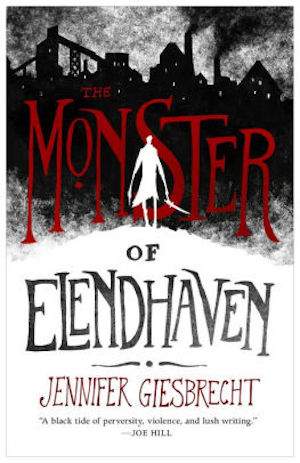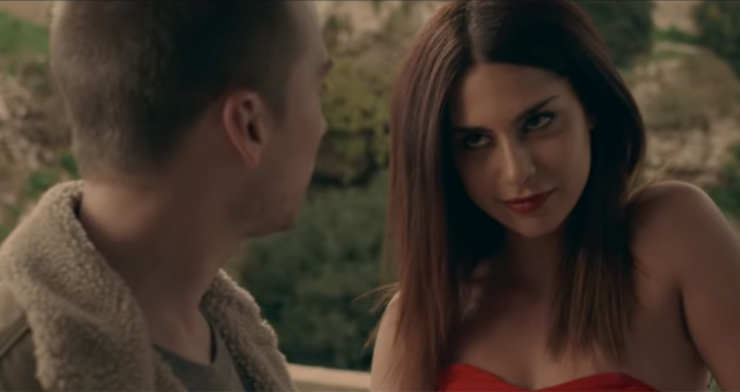For most horror movie fans, the 1981 Canadian flick My Bloody Valentine is the obvious choice for required viewing on February 14th. The movie offers everything the holiday demands: kissing, lots of pink hearts, and a killer in mining gear. My Bloody Valentine holds particular appeal to those who aren’t into the whole lovey-dovey thing: After all, what better way to undermine grandiose romantic claims than the sight of actual bloody hearts in decorative boxes?
But what if I told you there was a better option for horror fans who might not be sold on the idea of romance? A movie that climaxes with a man and a woman ending their spontaneous week-long affair trying to decide if it will continue for the rest of their lives?
Okay, I know that sounds more like the end of a romantic drama than it does a horror film, but that’s the appeal of 2014’s Spring. Written by Justin Benson and directed by Benson and Aaron Moorhead, Spring explores and underscores the scary parts of being in love. The film infuses a standard romance plot with horror, not to undermine or mock the idea of falling in love, but to take our hopes and anxieties about love seriously. It’s a movie that examines the full cost of intimacy and commitment.
To be frank, Spring works best when watched with no prior knowledge of the plot. But it’s hard to analyze the movie without going into details, so full spoilers will follow. If you haven’t seen Spring yet, I recommend that you stop reading now and go hunt it down. If you have seen it, read on!
The story follows Evan (Lou Taylor Pucci), a young American living in Italy after his life in the States falls apart. He meets Louise (Nadia Hilker) a polyglot grad student studying art in Naples. Also, Louise is 2000 years old. Every twenty years, a biological function drives Louise to mate and procure new DNA, which allows her to regenerate herself.
Louise shows immediate interest in Evan, but her condition makes her unable to commit to a relationship—especially since she develops a hunger for flesh and mutates, transforming into various strange creatures, at the end of every 20-year cycle. Evan falls immediately for Louise. Neither her elusive behavior nor the sight of her in the form of a squid monster dissuades him. Convinced that she is the love of his life, Evan pledges himself to Louise, in all her complexity.
That description admittedly makes Spring sound like a version of the classic Beauty and the Beast story, one that inverts the genders but leaves intact the bad relationship advice. To be sure, a lesser story would have made Evan a saintly nice guy who loves Louise despite her faults and thus deserves access to her body and emotions. But Evan is no nice guy. He may be capable of great compassion, as illustrated by the care he gives his dying mother in the film’s opening scene, and his father’s sudden death a few months earlier gives him the allure of a tragic backstory. But he’s also capable of impulsive, and sometimes violent, decisions.
Buy the Book


The Monster of Elendhaven
More importantly, Evan’s personal growth is parallel, but not dependent upon, his relationship with Louise. After his parents’ deaths, Evan has nothing but destructive friends and surface-level relationships at home. When opportunities to continue those patterns present themselves in Italy, Evan has sense enough to change his ways. Pucci plays Evan as a man who wants to be vulnerable and loving, but who cannot find a model for it. He finally finds that model when he begins working on a citrus farm for elderly widower Angelo (Francesco Carnelutti) and follows it when pursuing Louise.
Hilker has an even more difficult task, playing Louise as a woman falling in love for the first time in 2000 years. She often comes across as aloof and defensive, responding to Evan’s first flirtations by inviting him to her apartment and later sneaking out of bed in the middle of the night. But her decisions stem from her biological imperative. She must be around people to mate and regenerate, but she cannot have long-term relationships with people she will outlive and possibly destroy. Louise is a tragic figure, at once trying to shape her own identity while protecting others.
Upon learning about her condition, Evan asks Louise if she’s “a vampire, werewolf, witch, or alien.” Louise answers, “human.” To be sure, Louise is the “monster” of this story, and we do see her kill a rabbit and a person. But both cases only reinforce her humanity. The rabbit dies when Louise, in desperation, tries a pagan ritual to complete her transition without mating. When it fails, the desire for meat overwhelms her and forces her to eat her rabbit. The human victim is a stereotypical ugly American who, mistaking Louise’s writhing in an empty alley as proof of inebriation, tries to rape her. Although it’s presented as a justified killing of a loathsome character, the act leaves us scared and concerned for both Louise and Evan. How can she have a relationship with another person if her body drives her into such dangerous states? How could Evan ever be safe with her?
Hilker plays Louise as someone who wants to be vulnerable. In one of the movie’s most effective scenes, Evan arrives for a date to find Louise distant and standoffish. In the throes of transformation, she claims that she’s sick and doesn’t want to be around anyone. Rather than take offense, Evan offers to stay and care for Louise, an offer she accepts. Moorhead (who also served as cinematographer) drifts the camera along Louise’s face as she lies on the couch and allows Evan to cover her with a blanket, catching Hilker’s demeanor shift from fearful rejection to gratitude and affection.
Moments such as these reoccur throughout the film, as both halves of the couple try earnestly to figure out what they mean to each other. When Louise asks Evan about his family, he refuses to answer and must chase after her when she storms off in frustration. After he first helps Louise turn back to normal from her devolved creature state, Evan stalks the Naples streets in anger and confusion as Louise tags behind and tries to explain. They each see something in the other; they both feel an attraction and sense a future together, even if they have no idea what that future will look like. They understand that they won’t be safe together, but they can’t figure out how to be okay with that danger.
Benson and Moorhead illustrate that constant sense of danger and dread with their camera work. Establishing shots capture rotting animal corpses and signs of decay. Drone shots zoom through the city, connecting the threat of Louise to all of Naples. The scene of Louise explaining her condition is a single continuous shot, which communicates the desperation she and Evan both feel. The camera stays on Evan as he storms through the alleyways, needing to move but unsure of where he’s going. Louise runs in and out of frame, dropping all sorts of scientific mumbo-jumbo as she tries to explain and to convince him to stay.
Louise’s request might seem utterly bizarre, but the movie never lets us think of her as anything other than natural and rational. She is, as she already explained, a human. And humans die, as does everything else. Evan witnesses death in the movie’s very first scene. He’s reminded of it when he watches Angelo mourn his wife and when he observes artifacts from Louise’s past. They know that staying apart will not shield them from death. But they also know that staying together will intensify their pain.
This tension drives the climactic sequence, in which Evan and Louise spend their final 24 hours together. Evan has already seen Louise at her worst and wants to commit himself to her. Louise has strong feelings for Evan but cannot say that she loves him yet. If she does love him, her body will not regenerate itself. It will use the cells it already has to sustain her; she will not change and will instead live a finite, normal human life. If she does not love him, her last transformation will be the most feral. And so Evan and Louise decide to spend this time together, both knowing full well that she may kill him and have to live forever with the regret of the lost opportunity.
This closing sequence encapsulates the horror of Spring. Although Louise is scary in her incarnations, she’s not the horror of the film. Instead, it’s the knowledge that commitment to another person requires the loss of self. It’s the knowledge that vulnerability means that you will be hurt, that another person might mistreat you and even destroy you. It’s the fact that you will never fully comprehend other people with whom you live, and they will eventually leave you when they die.
Frankly, that’s not only one of the most romantic things I’ve seen in a movie—it’s also one of the scariest. Scarier, at least, than anything a pickaxe-wielding slasher in a headlamp might have to offer.
Joe George‘s writing has appeared at Think Christian, FilmInquiry, and is collected at joewriteswords.com. He hosts the web series Renewed Mind Movie Talk and tweets nonsense from @jageorgeii.










